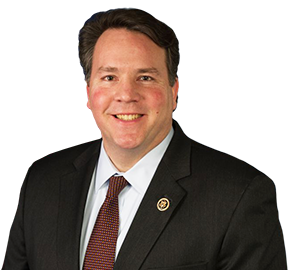WHEELING — The $1.9 trillion COVID relief stimulus package bill passed by Congress this week was, in U.S. Rep. David B. McKinley’s opinion, filled with bloat and still didn’t include enough money to fight opioid addiction.
McKinley, R-West Virginia, joined all Republicans in Congress in voting against the COVID relief bill, which President Joe Biden signed into law Thursday.
The final bill contains $1.5 billion for community mental health services relating to addiction, and another $1.5 billion for the treatment of drug and alcohol abuse. McKinley had requested another $3 billion be added to the amount in the House, but that request was denied.
“This bill … fails to provide adequate funding to combat the opioid crisis,” McKinley said in a statement released this week. “In fact, Democrats could only support less than one-tenth of a percent to fund substance abuse and mental health services.
“Additionally, there’s still $1 trillion of pandemic relief that hasn’t been spent yet and it will take years for all of this additional COVID money to be sent out,” he continued. “Right now, the American people are counting on Congress to provide them with additional support during these unprecedented times, however, this bloated bill doesn’t accomplish that goal.”
Last month, McKinley made his plea to Congress to put more funding toward opioid addiction. He compared the number of deaths last year due to COVID to the number of drug-related deaths in the nation during 2020.
He said COVID is killing people at five times the rate of substance abuse deaths, but America is spending 750 times the money to deal with COVID than with substance abuse. McKinley has compared the $8 billion in federal dollars allocated to substance abuse treatment during 2020 to the $6 trillion spent on COVID last year.
“Rather than provide targeted and temporary relief to the American people who are facing hardships due to the pandemic, the Democrats chose to jam through a partisan stimulus bill that spends nearly $2 trillion on progressive policies unrelated to COVID,” McKinley said.
“We know that the American people need support to crush this virus and return to a sense of normalcy, that’s why I’ve supported provisions like individual stimulus checks, funding for COVID-19 vaccine development and distribution, and funding to support safe school reopening. However, rather than deal exclusively on these priorities, Democrats delivered a bloated bill to the House floor that gives stimulus checks to prisoners, money to support government funded abortions, and billions to bailout states that mismanaged their funds.”
McKinley pointed out what he considered bloat contained in the stimulus bill:
– Illegal immigrants and prisoners would be able to receive stimulus checks.
– Individuals making around $51,000 annually and families of four with an annual income of $106,000 would receive healthcare subsidies.
– $130 billion would go to America’s schools, without any timeframe for students returning to school in many states.
– $350 billion is earmarked for “bailout to Democrat-led states” with budget issues, according to McKinley.
– There is a $300 weekly boost in unemployment benefits until September.
– $50 million is included to fund abortions, according to McKinley.
Ohio Rep. Bill Johnson, R-Ohio, shared McKinley’s thoughts on the relief bill.
“The bottom line is the Democrats’ almost $2 trillion COVID relief legislation has very little to do with combatting the coronavirus or bringing relief to those Americans affected by it,” he said. “In fact, less than 9 percent of this latest legislation goes directly toward addressing COVID public health concerns, and much of the money won’t be spent for years. Plus, there is still approximately $1 trillion left unspent from the bipartisan relief bills that Congress passed and became law last year.”
U.S. Senator Rob Portman, R-Ohio, also spoke against the bill. He, along with Sen. Shelley Moore Capito, R-W.Va., was part of a group of 10 GOP senators who pitched an alternative pared-down relief bill to Biden.
“There are parts of this bill, especially those that mirror our Republican alternative on supporting the production and distribution of additional vaccines, that will help,” Portman said. “But there are hundreds of billions in spending in this measure that are unnecessary when we know that nearly half of the last $900 billion COVID-19 relief package enacted in December has yet to be spent. We also know that a significant portion of spending in the bill signed into law today won’t be spent well into next year and years later.”
Capito had not released a new statement on the bill’s Wednesday passage through the House, but mirrored many Republican criticisms in discussing her “no” vote on the bill in the Senate — a lack of bipartisanship coupled with too much spending on non-COVID issues.
“Instead of joining together, Democrats took advantage of a pandemic and chose to poison this relief bill with a trillion dollars of unrelated spending items that have been on their wish lists for years,” she said.
Rep. Alex Mooney, R-West Virginia, also voted against the bill, which he said allocated just 9% of its funds to combatting COVID.
“Americans will be burdened by another $2 trillion in national debt,” he said, “all while $46 billion of previously appropriated state and local coronavirus relief funds remain still unspent.”
Rep. Carol Miller, R-West Virginia, did not immediately return requests seeking comment.

